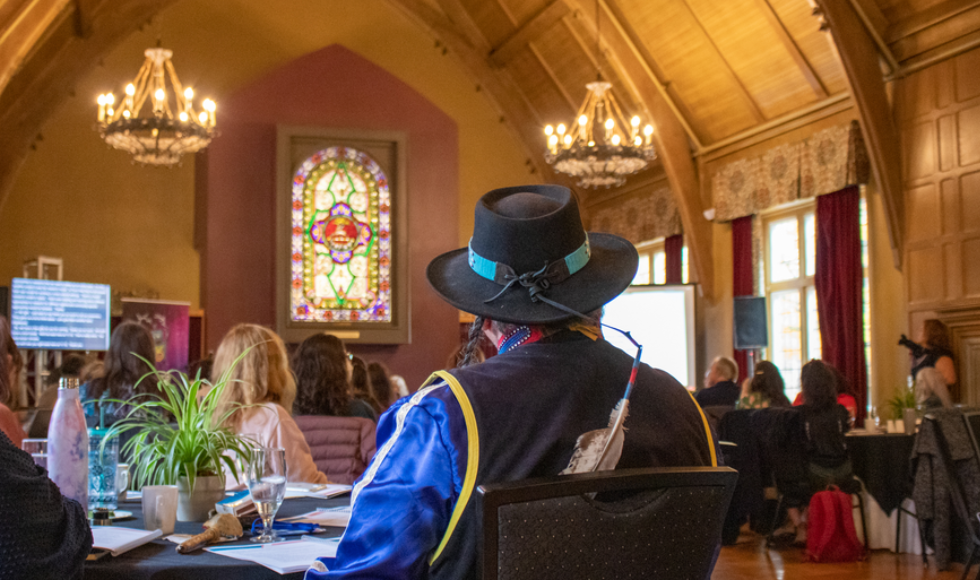Indigenous Research Day highlights important work being done at McMaster

Elder Myeengun Henry listens as researchers and knowledge keepers share their work as part of the first annual Indigenous Research Day at McMaster University. (Photo by Christian Braun/McMaster University).
“Wherever you go, there you are, on native land” – Savage Bear, director of the McMaster Indigenous Research Institute (MIRI)
From using digital storytelling for intergenerational learning, to creating ethical spaces of engagement in child welfare, to giving future physicians the tools to provide culturally competent care, the first annual Indigenous Research Day at McMaster highlighted the varied, compelling and important work being done at McMaster in the field of Indigenous Studies.
The day-long event, which was co-hosted by the McMaster Indigenous Research Institute (MIRI), the Indigenous Health Learning Lodge, the Indigenous Studies Department, Indigenous Student Services, the FEAST Centre for Indigenous STBBI Research and University Advancement, featured presentations from researchers and knowledge keepers.
Savage Bear, the director of the McMaster Indigenous Research Institute (MIRI), says that, in addition to MIRI’s primary goal of amplifying the voices of Indigenous researchers, it’s important to create a space for sharing and collaboration.
“When we asked our faculty to tell us, ‘What is Indigenous research?’ it provoked these amazing conversations,” says Bear. “And so why not share that with everyone?”
“And who knows what fruit might come with this cross pollination? So, it’s very exciting to have something like this.”
Below are some photos and highlights from the event.

Bear emceed the event, which took place inside Alumni Memorial Hall and featured 13 presentations from Indigenous researchers, knowledge keepers and non-Indigenous allies.
“I would like people to know that Indigenous research doesn’t just tell what we’ve done in the past. It incorporates that essence, but also looks ahead to the future,” says Bear. (Photo by Elizabeth DiEmanuele/McMaster University).

Bernice Downey, Jennifer Walker and Lori Davis Hill shared how those at the Indigenous Health Learning Lodge (IHLL) are working to address barriers Indigenous health researchers face in their work. Walker says she likes to think of the university as the soil in which the roots of research can take hold, and that they are working to make that soil rich and fertile.
“What kind of environment can we build for our future researchers?” asked Davis Hill. (Photo by Christian Braun/McMaster University).

Bonnie Freeman, Daniel Coleman, Carrie McMullin, Ki’en Debicki, Alexandra Nychuk, Chelsea Gabel and Gita Ljubicic were among the 19 researchers and knowledge keepers who shared their work.
Freeman, Coleman and Debicki shared their exploration of the continued relevance of the oldest known treaty between Europeans and Indigenous North Americans, while McMullin shared her findings in the mythology of Six Nations as loyalists.
Gabel and Nychuk shared how they are using digital storytelling to explore intergenerational understandings of Metis identity. Ljubicic presented some of the StraightUpNorth (SUN) research team’s findings into enhancing societal and ecological well-being in the Canadian North. (Photo by Christian Braun/McMaster University).

Rick Monture, the recipient of McMaster’s 2021 Indigenous Scholar-in-Community fellowship, reflected on how, as a McMaster student, he witnessed the Oka Crisis force a “cataclysmic change” in the conversations around Indigenous Studies at McMaster University.
Monture, one of the first Indigenous faculty members at McMaster, shared stories of growing up on the Six Nations of the Grand River Territory and the racism and oppression his family and community members faced. (Photo by Elizabeth DiEmanuele/McMaster University).

Graphic artist Pamela Hubbard worked throughout the day to capture the thoughts, concepts and ideas generated by the presentations and discussions into a visual, graphic recording. (Photo by Elizabeth DiEmanuele/McMaster University).

“For me, as someone new to Mac, this has really helped me in terms of the context of Indigenous Studies, and Indigenous education and Indigenous research at Mac, and to see that it goes back a long way before the creation of the Indigenous Studies program,” says Robert Innes, the chair of McMaster’s newly created Indigenous Studies department. (Photo by Elizabeth DiEmanuele/McMaster University).

The McMaster Indigenous Research Institute (MIRI) team is made up of members (from left to right) Elya Porter, Savage Bear, Katelyn Knott and Sara Howdle. (Photo by Krista Knott)
Bear says the MIRI team will continue to amplify the voice of Indigenous researchers and hopes to build on the momentum of the newly-created Indigenous Studies department to attract Indigenous graduate students in all areas of study to McMaster.

(Photo by Elizabeth DiEmanuele/McMaster University).


